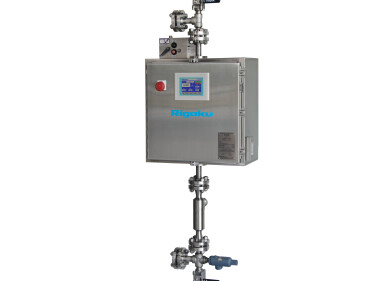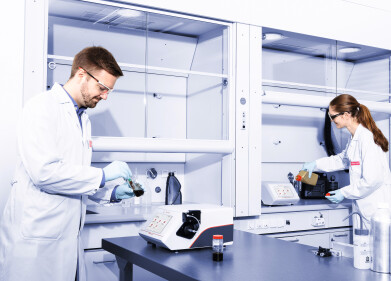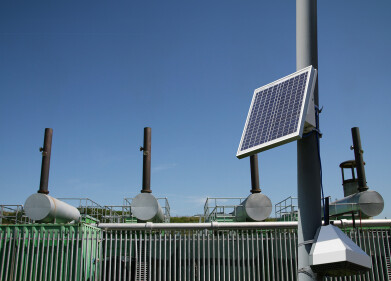Measurement and Testing
Wireless solution for the industrial IoT, adds value in plant maintenance.
Feb 11 2019
Yokogawa Electric Corporation has announced that it will release the Sushi Sensor, an OpreXTM brand wireless solution, in markets other than Japan, starting with Europe (shipping in March 2019). Already available in Japan, the Sushi Sensor is a compact wireless device with integrated sensing and communication functions that is intended for use in the monitoring of plant equipment vibration and surface temperature. Optimised for industrial IoT (IIoT) applications, the Sushi Sensor enables the online monitoring of equipment operating conditions, which helps to improve equipment maintenance and prevent failures by detecting signs of abnormalities at an early stage.
As manufacturers strive to improve productivity and the efficiency of their plant maintenance operations, they have a growing need for solutions that facilitate the collection of equipment data. This is driving demand for wireless sensors that are easier and cheaper to install than conventional wired devices.
To detect signs of equipment abnormalities at an early stage and prevent unexpected equipment failures, it is essential to frequently measure the vibration and surface temperature of plant equipment such as compressors, pumps and motors, and to enable the monitoring of such data online. Although crucial equipment may already be continuously monitored by using wired sensors, this may be difficult with many other types of equipment due to the high initial cost and the challenges of wiring devices in difficult to access locations. Such equipment must be inspected during operator rounds or periodic inspections. Therefore, there is an increasing need for wireless vibration and temperature sensors that can be installed easily and at a low cost, to improve maintenance efficiency.
To meet this need, Yokogawa has developed the Sushi Sensor, a compact wireless device that measures vibration and temperature and uses LoRaWANTM, a low-power wide-area (LPWA) wireless data communication protocol that is attracting considerable interest among developers for use in IIoT applications. LPWA is a wireless communications technology which is optimised for long-distance communications and low-power consumption. LoRaWAN, an LPWA protocol that is based on an open standard, is promoted by the LoRa Alliance of more than 500 IoT companies and users worldwide.
Yokogawa released the Sushi Sensor in the Japan market in March 2018, and has already established a solid track record with the device. Yokogawa also offers field wireless systems that comply with the proven and highly reliable ISA100 WirelessTM standard and help to ensure stable and safe plant operations. This wireless networking technology based on the ISA100.11a wireless communication standard for industrial automation that was developed by the International Society of Automation (ISA).
The European release of the Sushi Sensor is set for 2019, with other regions following after that, giving its customers in various markets a greater range of optimum solutions to choose from.
The compact wireless sensor complies with the LoRaWAN communication standard for long-distance communications, and thus needs no repeaters. It is also battery-powered, eliminating the need for an external power supply. Being compact and light-weight, this sensor can be mounted easily on all kinds of plant equipment. In addition, the sensor supports near-field radio communication (NFC), which allows sensor setting and sensor condition monitoring from a smartphone via a dedicated app. This technology is suitable for short-range communications, over a distance of several centimeters, enabling quick data exchange.
Although vibration sensors and temperature sensors for IoT applications are commercially available, most of them were designed for indoor use. Yokogawa’s compact wireless Sushi Sensor is environmentally robust and is well suited for installation in harsh plant locations.
Data collected by the Sushi Sensor can be monitored either from an on-premise server or a cloud server via a LoRaWAN gateway. From the on-premise server or any device in a remote location that can access the cloud server, operators and maintenance staff can monitor the vibration and surface temperature of equipment throughout a plant.
For the monitoring of equipment operating conditions, the compact wireless sensor with integrated sensing and communication functions collects vibration and surface temperature data and transmits this data to an on-premise or cloud server via a LoRaWAN gateway.
Digital Edition
PIN 25.5 Oct/Nov 2024
November 2024
Analytical Instrumentation - Picturing Viscosity – How Can a Viscometer or a Rheometer Benefit You? - Sustainable Grease Formulations: Evaluating Key Performance Parameters and Testing Method...
View all digital editions
Events
Nov 27 2024 Istanbul, Turkey
Biogas Convention & Trade Fair 2024
Nov 27 2024 Hanover, Germany
Dec 03 2024 Dusseldorf, Germany
Dec 08 2024 Anaheim, CA, USA
Turkey & Black Sea Oil and Gas
Dec 11 2024 Istanbul, Turkey



















